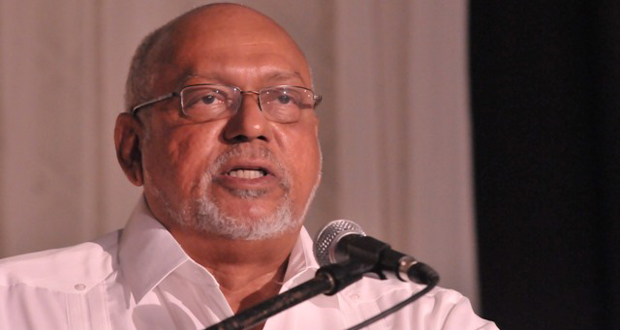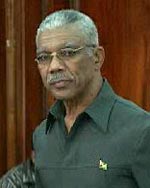
‘SHOWDOWN’ POLITICS IN GUYANA –Opposition outfoxed by Gov’t ahead of no-confidence motion
GUYANESE now anxiously monitoring political developments between the Government and the parliamentary Opposition following last Monday’s dramatic suspension of the country’s parliament by Head of State, Donald Ramotar, in the face of a then looming ‘no confidence’ motion against his People’s Progressive Party-led administration.With a one-seat majority in the 65-member National Assembly, the combined Opposition of the main People’s National Congress Reform (PNCR) and the minority Alliance For Change (AFC) were in readiness to debate their long-threatened no confidence motion at last Monday’s scheduled meeting of the National Assembly. But they were aware of the governing People’s Progressive Party’s firm opposition to any such move and of the constant warnings from President Donald Ramotar himself to authorise dissolution of parliament for new general elections, unless sober dialogue fails to move from a confrontational path. However, obsessed with the desire to debate their ’no confidence’ motion against the
Government, both the PNCR—which leads the Opposition in parliament under the umbrella of A Partnership for National Unity (APNU), by which it had contested the last general election in November 2011—may have overlooked a critical factor. This weakness in their strategy was fully exposed hours before Monday’s scheduled meeting of parliament when President Ramotar announced, in a surprising national broadcast, that, in accordance with his constitutional powers, he had issued a proclamation to prorogue (suspend) the National Assembly. Previously a long-serving General Secretary of the PPP, Ramotar had warned the Opposition that should they persist with their “no confidence” motion, he could be compelled to arrange for new general elections. Prorogation (suspension) and dissolution (terminal ending of the life of a parliament) are different factors in a multi-party parliamentary democracy, as citizens of Jamaica and other CARICOM states would know. President Ramotar has been holding “consultations” with the PNCR leader, David Granger, in his position as parliamentary Opposition Leader, on a range of issues, including much overdue local government elections—an opposition demand–as well as the growing apprehension by the Head of State about the dangers being posed to social and economic progress by divisive, non-cooperation and even hostile opposition politics. However, following their manoeuvres over recent weeks to move the no confidence motion—including with the office of the Speaker of Parliament, Raphael Trotman—a former defector of the PNC and first leader of the AFC—the Opposition decided to move ahead with the “no confidence” motion at Monday’s meeting of the National Assembly.
Pre-emptive strike?
They didn’t get the chance for so doing. Hours before the Assembly was scheduled to meet on Monday afternoon, President Ramotar resorted to a pre-emptive strike with a national broadcast.
Via that medium, the President informed the nation he had exercised his constitutional powers to authorise the prorogation (suspension) of the National Assembly.
The Opposition’s political gamble had apparently overlooked this vital alternative, also available to the President, to that of dissolution of parliament. It frustrated the formal introduction of the proposed no-confidence motion against his Government.
The crucial difference is that, constitutionally, prorogation of parliament is effectively a temporary suspension in contrast to a dissolution in preparation for fresh elections.
According to established parliamentary norms, prorogation and dissolution have become a way of multi-party political life across the entire Caribbean Community, with the latter associated with readiness for new elections—as happening currently in a few sates of CARICOM
New elections
New general elections are not due in Guyana before November 2016.
The November 2011 poll produced the surprising results that gave the incumbent PPP/C 32 seats to 33 for the combined APNU (read PNC plus) and AFC.
Outfoxed, APNU’s chairman and PNCR leader, Granger, an ex-Brigadier of the Guyana Defence Force for a period under PNC governance, was to declare President Ramotar’s prorogation of parliament as “the darkest day for democracy in Guyana”.
Those familiar with Guyana’s post-independence governance under the PNC, could easily mark one for political hyperbole against Granger’s “darkest day” claim.
The PNCR leader had also urged organised picketing demonstrators outside parliament building on Monday to be ready for “mass protests” against the Government.
For his part, the President was to link his broadcast statement on suspension of the current 10th parliament with an assurance to use the period to engage the Opposition for “a return to normalcy” prior to moving for “early general elections…”—not due before November 2016.
Early reactions have included the Opposition’s expected rejection of the President’s call for new dialogue to resolve outstanding governance issues, as well as expressed support of cooperation from leading private sector and labour movement officials.
OAS response
For his part, Secretary General of the Organisation of American States (OAS), Jose Miguel Insulza, noted in a media statement that the prorogation of the Guyana parliament was done within the framework of the country’s constitution. He, however, expressed the hope that resumption of the 10th parliament would occur “in the shortest possible time”.
Meanwhile, the crucial question remains: “For whom the bell tolls”? With the combined Opposition having much of their own internal problems to resolve, and the Guyana Elections Commission (GECOM) still to be in complete readiness for a snap poll, new national elections should not be realistically expected before the first half of 2015. And it could well be combined with the much overdue local government poll. So, stay tuned.(Analysis by
Rickey Singh)
(Rickey Singh is a noted Barbados-based Caribbean journalist)



